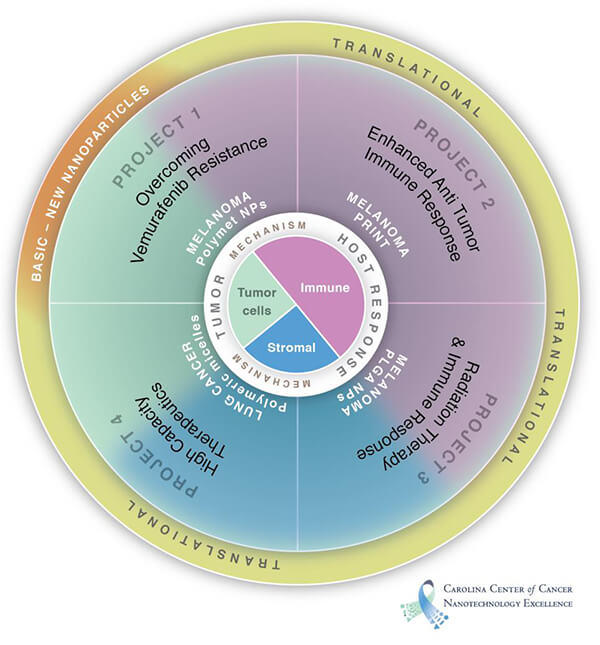University of North Carolina, Chapel Hill — Nano Approaches to Modulate Host Cell Response for Cancer Therapy
Center Overview
Host response targeting of both immune and stromal components represents an enormous opportunity to overcome cancer through the body's built in defense mechanisms. The focus of the UNC-Chapel Hill CCNE is to exploit the host response through nano approaches for cancer disease management and treatment. The research team is led by Principal Investigators Leaf Huang, Ph.D. and Joel Tepper, M.D. Leaf Huang is a pioneer in liposome research and non-viral gene therapy. He was the first
- to publish grafting polyethylene glycol to liposomes to enhance the circulation time; and
- to develop a low toxicity cationic lipid for gene transfection.
Joel Tepper, M.D. is an accomplished leader and clinical and translational investigator who has contributed at both the local and national level to translational research and was co-PI of the previous UNC CCNE. The Center proposes developing targeted methods for the delivery of biologics and immunologic modifiers and chemotherapies against melanoma and non-small cell lung cancers (NSCLC), utilizing innovative nanotechnologies developed at UNC. There are four projects in the CCNE. The projects revolve around the central theme of exploiting the host response against tumors with an emphasis on the immune response. Center projects emphasize the treatment of malignant melanoma, an aggressive tumor with a strong immunological component, and NSCLC, a tumor that when advanced is not well treated by most therapeutic modalities.
Projects
Project 1: Nanotherapies for Vemurafenib Resistant Melanoma
Project Investigators: Leaf Huang, Ph.D., Jenny Ting, Ph.D., and William Kim, M.D.
Project 1, led by Leaf Huang, Jenny Ting, a world renowned immunologist, and William Kim, a physician scientist with expertise in tumor biology and cancer genomics, is the designated basic science project. Novel polymetformin nanoparticles are being proposed for more efficient and effective delivery of siRNA, which is a critical challenge for drug delivery. The project targets vemurafenib resistant melanoma, and emphasizes direct suppression of drug resistance that is coupled with a new vaccine approach to enhance the effectiveness of treatment of this aggressive tumor.
Project 2: Nanoparticle-based Immune Modulators in Cancer Therapy and Vaccines
Project Investigators: Jenny Ting, Ph.D., Jon Serody, M.D., and Joseph DeSimone, Ph.D.
Project 2, led by Jenny Ting and Joe DeSimone, an internationally known chemist with major awards for his contributions to chemistry and nanotechnology, along with Jon Serody, a physician scientist who is co-Director of the Immunology Program at the UNC-LCCC. This project evaluates ways to enhance the anti-tumor immune response through novel delivery of antigens via Particle Replication in Non-wetting Templates (PRINT®) nanoparticles. Unique adjuvants, such as Pathogen-associated Molecular Patterns, are being explored in this project as well as the active suppression of blockers of host immunity in melanoma.
Project 3: Combining Radiotherapy and Nanotechnology for Immunotherapy
Project Investigators: Andrew Wang, M.D., Jon Serody, M.D., and Joel Tepper, M.D.
Project 3, led by Dr. Andrew Wang, a physician-scientist with experience in the development of nanotherapeutics, along with Jon Serody and Joel Tepper, and takes advantage of the biology of antigen release and the abscopal effect post irradiation through specifically designed nanoparticles to enhance antigen capture and the immune response to both primary tumors and metastases in melanoma.
Project 4: High Capacity Polymeric Micelle Therapeutics for Lung Cancer
Project Investigators: Alexander Kabanov, Ph.D., D.Sc., Chad Pecot, M.D., and Andrew Wang, M.D.
Project 4, led by Alexander Kabanov, who has conducted pioneering research on polymeric micelles, NDA/polycation complexes, block ionomer complexes and nanogels, along with Chad Pecot, a physician-scientist interested in RNA interference, and Andrew Wang. This project uses polymeric micelles with high capacity loading to deliver therapeutics targeted to the tumor microenvironment as well as tumor cells in NSCLC.
Cores
Small Animal Imaging Core
Core Investigator: Zibo Li, Ph.D., Wieli Lin, Ph.D., and Hong Yuan, Ph.D.
The small animal imaging core leverages extensive UNC small animal imaging capabilities to enhance biodistribution studies and to develop multimodality imaging approaches to evaluate treatment efficacy. The core is led by Zibo Li, Wieli Lin and Hong Yuan, all expert imagers involved in animal imaging and technology development.
Developmental Program
Center Program Director: Leaf Huang, Ph.D.
The Development Program encompasses both pilot projects and auxiliary projects, designed to facilitate the development of new ideas to produce preliminary data for grant applications. The program is intended to support 4 pilot projects annually. There will also be funding available to foster collaborations between Alliance members as well as with other institutions. The Administrative Core is designed to facilitate all of the operations of the UNC CCNE to assure that the scientific work can proceed with maximal efficiency.
